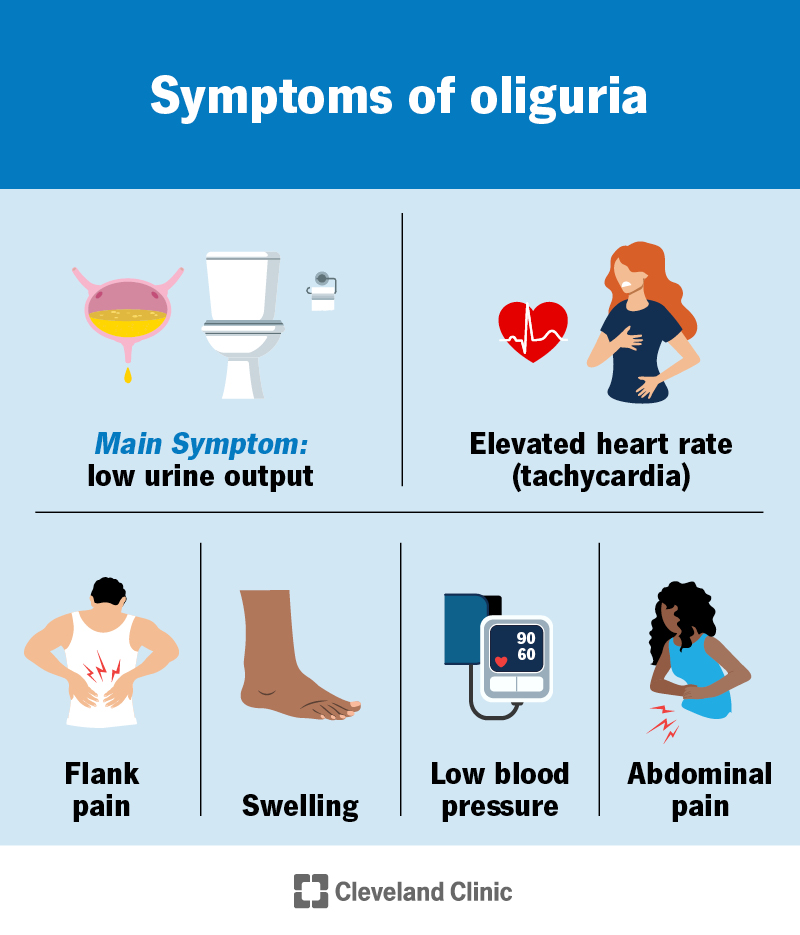Oliguria is the medical term for low urine output or peeing less than you expect. There are many different causes. If you have a blockage, your kidneys are producing pee but it can’t easily leave your body. If you aren’t producing pee, you may have a condition that affects your kidneys, heart or lungs. Treatment depends on the cause.
Advertisement
Cleveland Clinic is a non-profit academic medical center. Advertising on our site helps support our mission. We do not endorse non-Cleveland Clinic products or services. Policy

Image content: This image is available to view online.
View image online (https://my.clevelandclinic.org/-/scassets/images/org/health/articles/oliguria)
Oliguria (pronounced al-uh-GYOOR-ee-uh) is a medical term for low urine output (how much you pee). “Oliguria” is a big word. Breaking it apart can help you understand the meaning:
Advertisement
Cleveland Clinic is a non-profit academic medical center. Advertising on our site helps support our mission. We do not endorse non-Cleveland Clinic products or services. Policy
In adults, oliguria means you pee less than 400 milliliters (mL) to 500 mL (around two cups) of pee per 24 hours.
For infants and children, the numbers depend on weight. For an infant, the output is less than 1 mL/kilogram (kg)/hour. For children, the output is less than 0.5 mL/kg/hour.
Low urine output is relatively common because it can have so many causes. It’s not always dangerous. But it can be, depending on the cause.
Healthcare providers may classify oliguria according to how long it takes to develop:
The primary symptom of oliguria is that you’re not peeing as much as you should be. Other symptoms depend on the underlying cause. They may include:
Advertisement
Oliguria can be:
Pre-renal causes may include:
Renal causes may include:
Post-renal causes refer to blockages in your urinary system, such as a:
If you have a blockage, your kidneys still make pee, but the pee can’t leave your body.
Not always. But a low urine output can result from not drinking enough fluids (dehydration).
Low urine output can happen to anyone. But it’s more likely to happen if you have certain types of kidney diseases that can lead to acute kidney injury (AKI).
Low urine output is somewhat common among people who are on dialysis or who are already in the hospital. You may also be at a greater risk of developing oliguria if you’re 50 or older.
One of the most common complications in acute oliguria is that your kidneys suddenly can’t do a good job filtering toxins or wastes from your blood. This can lead to acute kidney failure. Potentially deadly complications of acute kidney failure include:
A healthcare provider will take a complete medical history and perform a physical exam. They may also recommend tests such as:
Oliguria treatment depends on the cause of low urine output:
Advertisement
It depends on the cause. You should drink fluids if your urine output is low because you haven’t been taking in enough fluids. Plain water and rehydration solutions that contain electrolytes are good options. Some rehydration options include:
If you have issues with your heart or kidneys, make sure you follow any directions a healthcare provider makes regarding medications, fluid intake and food choices. If you notice you aren’t peeing as much as you usually do, try increasing your fluid intake and contact a provider. One sign of dehydration and reduced urine output is that the color of your pee turns a darker yellow.
Advertisement
You may wish to ask a provider questions such as:
Get help right away if you aren’t peeing as much as you think you should be and you have symptoms like:
Your outlook depends on what’s affecting your urine output. But if you’re not peeing as much as you should be, that’s your body’s way of telling you that something is wrong, and you should reach out to a healthcare provider right away. Without treatment, serious complications can develop.
If you have diarrhea or are vomiting, make every effort to keep taking in fluids. It’s important to note low urine output as early as you can.
If you have problems breathing or issues with your kidneys or heart, follow a healthcare provider’s directions as far as how much you should drink each day and what you should eat.
Many people find it awkward to talk about peeing. But keeping track of how often and how much you pee is an important way to monitor your health. If you’ve been vomiting or have diarrhea, try to drink more water to prevent dehydration. If you’re drinking normally and aren’t peeing as much as you think you should, it’s time to call a healthcare provider for a diagnosis and treatment. They understand it can be a little uncomfortable for some to talk about their bathroom habits, so they’ll do their best to help you relax.
Advertisement

Sign up for our Health Essentials emails for expert guidance on nutrition, fitness, sleep, skin care and more.
Learn more about the Health Library and our editorial process.
Cleveland Clinic’s health articles are based on evidence-backed information and review by medical professionals to ensure accuracy, reliability and up-to-date clinical standards.
Cleveland Clinic’s health articles are based on evidence-backed information and review by medical professionals to ensure accuracy, reliability and up-to-date clinical standards.
If you have a condition that’s affecting your urinary system, you want expert advice. At Cleveland Clinic, we’ll work to create a treatment plan that’s right for you.
